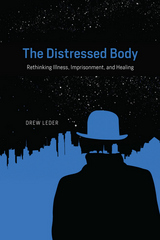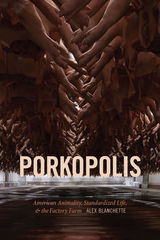3 books about Factory farms

The Distressed Body
Rethinking Illness, Imprisonment, and Healing
Drew Leder
University of Chicago Press, 2016
Bodily pain and distress come in many forms. They can well up from within at times of serious illness, but the body can also be subjected to harsh treatment from outside. The medical system is often cold and depersonalized, and much worse are conditions experienced by prisoners in our age of mass incarceration, and by animals trapped in our factory farms. In this pioneering book, Drew Leder offers bold new ways to rethink how we create and treat distress, clearing the way for more humane social practices.
Leder draws on literary examples, clinical and philosophical sources, his medical training, and his own struggle with chronic pain. He levies a challenge to the capitalist and Cartesian models that rule modern medicine. Similarly, he looks at the root paradigms of our penitentiary and factory farm systems and the way these produce distressed bodies, asking how such institutions can be reformed. Writing with coauthors ranging from a prominent cardiologist to long-term inmates, he explores alternative environments that can better humanize—even spiritualize—the way we treat one another, offering a very different vision of medical, criminal justice, and food systems. Ultimately Leder proposes not just new answers to important bioethical questions but new ways of questioning accepted concepts and practices.
Leder draws on literary examples, clinical and philosophical sources, his medical training, and his own struggle with chronic pain. He levies a challenge to the capitalist and Cartesian models that rule modern medicine. Similarly, he looks at the root paradigms of our penitentiary and factory farm systems and the way these produce distressed bodies, asking how such institutions can be reformed. Writing with coauthors ranging from a prominent cardiologist to long-term inmates, he explores alternative environments that can better humanize—even spiritualize—the way we treat one another, offering a very different vision of medical, criminal justice, and food systems. Ultimately Leder proposes not just new answers to important bioethical questions but new ways of questioning accepted concepts and practices.
[more]

Porkopolis
American Animality, Standardized Life, and the Factory Farm
Alex Blanchette
Duke University Press, 2020
In the 1990s a small midwestern American town approved the construction of a massive pork complex, where almost 7 million hogs are birthed, raised, and killed every year. In Porkopolis Alex Blanchette explores how this rural community has been reorganized around the life and death cycles of corporate pigs. Drawing on over two years of ethnographic fieldwork, Blanchette immerses readers into the workplaces that underlie modern meat, from slaughterhouses and corporate offices to artificial insemination barns and bone-rendering facilities. He outlines the deep human-hog relationships and intimacies that emerge through intensified industrialization, showing how even the most mundane human action, such as a wayward touch, could have serious physical consequences for animals. Corporations' pursuit of a perfectly uniform, standardized pig—one that can yield materials for over 1000 products—creates social and environmental instabilities that transform human lives and livelihoods. Throughout Porkopolis, which includes dozens of images by award-winning photographer Sean Sprague, Blanchette uses factory farming to rethink the fraught state of industrial capitalism in the United States today.
[more]

Tamarack River Ghost
A Novel
Jerry Apps
University of Wisconsin Press, 2012
When journalist Josh Wittmore moves from the Illinois bureau of Farm Country News to the newspaper’s national office in Wisconsin, he encounters the biggest story of his young career—just as the paper’s finances may lead to its closure.
Josh’s big story is that a corporation that plans to establish an enormous hog farm has bought a lot of land along the Tamarack River in bucolic Ames County. Some of the local residents and officials are excited about the jobs and tax revenues that the big farm will bring, while others worry about truck traffic, porcine aromas, and manure runoff polluting the river. And how would the arrival of a large agribusiness affect life and traditions in this tightly knit rural community of family farmers? Josh strives to provide impartial agricultural reporting, even as his newspaper is replaced by a new Internet-only version owned by a former New York investment banker. And it seems that there may be another force in play: the vengeful ghost of a drowned logger who locals say haunts the valley of the Tamarack River.
Josh’s big story is that a corporation that plans to establish an enormous hog farm has bought a lot of land along the Tamarack River in bucolic Ames County. Some of the local residents and officials are excited about the jobs and tax revenues that the big farm will bring, while others worry about truck traffic, porcine aromas, and manure runoff polluting the river. And how would the arrival of a large agribusiness affect life and traditions in this tightly knit rural community of family farmers? Josh strives to provide impartial agricultural reporting, even as his newspaper is replaced by a new Internet-only version owned by a former New York investment banker. And it seems that there may be another force in play: the vengeful ghost of a drowned logger who locals say haunts the valley of the Tamarack River.
[more]
READERS
Browse our collection.
PUBLISHERS
See BiblioVault's publisher services.
STUDENT SERVICES
Files for college accessibility offices.
UChicago Accessibility Resources
home | accessibility | search | about | contact us
BiblioVault ® 2001 - 2024
The University of Chicago Press









